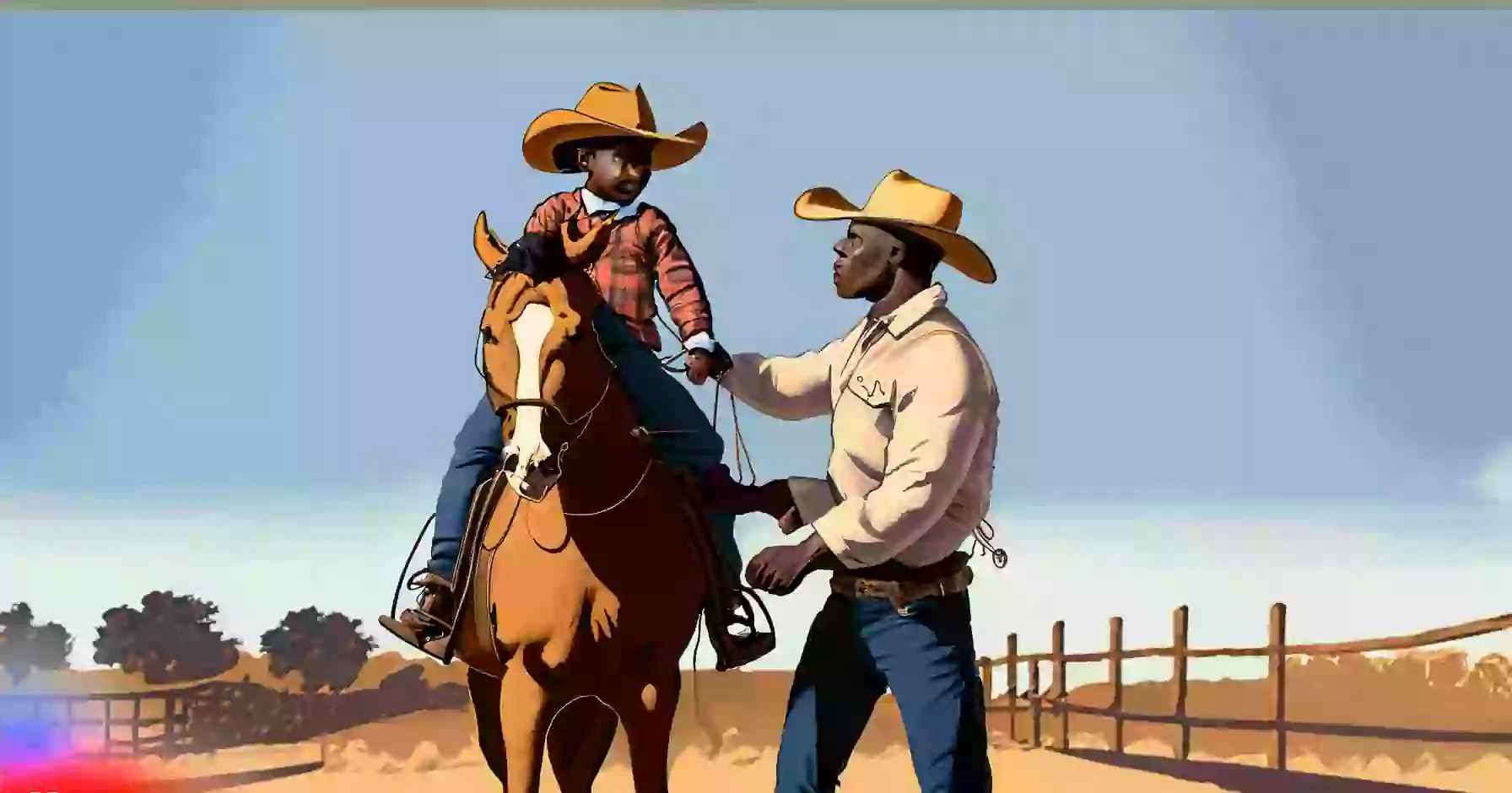The American cowboy is a romanticized figure in American culture, often depicted as a rugged individual who lives by a strict code of ethics. But what were the actual beliefs of cowboys?
Cowboys were a diverse group of people, and their beliefs varied depending on their individual backgrounds and experiences. However, there were some core beliefs that many cowboys shared. These included:
- Self-reliance: Cowboys learned to rely on themselves and their skills to survive in a harsh environment. They were often away from home for long periods of time and had to be able to take care of themselves.
- Honesty: Cowboys were known for their honesty and integrity. They were expected to keep their word and to be fair in their dealings with others.
- Courage: Cowboys faced many dangers in their work, such as wild animals, bad weather, and hostile Native Americans. They were expected to be brave and to face these dangers without fear.
- Loyalty: Cowboys were loyal to their fellow cowboys, their ranches, and their families. They were willing to put their lives on the line to protect those they cared about.
- Respect: Cowboys respected the land, the animals, and the people they worked with. They were taught to be kind to animals and to treat others with respect, regardless of their race or social status.
These beliefs helped to shape the cowboy code, a set of unwritten rules that governed the behavior of cowboys. The cowboy code was based on self-reliance, honesty, courage, loyalty, and respect. It helped to create a sense of community among cowboys and to ensure that they could work together effectively.
The cowboy code is still relevant today. It teaches us the importance of self-reliance, honesty, courage, loyalty, and respect. These are all qualities that we can all strive to embody in our own lives.
Cowboy Beliefs
Cowboys were a diverse group of people, and their beliefs varied depending on their individual backgrounds and experiences. However, there were some core beliefs that many cowboys shared. These included:
- Self-reliance: Cowboys learned to rely on themselves and their skills to survive in a harsh environment. They were often away from home for long periods of time and had to be able to take care of themselves. This included being able to ride a horse, rope a cow, and shoot a gun.
- Honesty: Cowboys were known for their honesty and integrity. They were expected to keep their word and to be fair in their dealings with others. This meant being honest with their employers, their fellow cowboys, and the people they met along the way.
- Courage: Cowboys faced many dangers in their work, such as wild animals, bad weather, and hostile Native Americans. They were expected to be brave and to face these dangers without fear. This meant being willing to stand up for what they believed in, even when it was difficult.
- Loyalty: Cowboys were loyal to their fellow cowboys, their ranches, and their families. They were willing to put their lives on the line to protect those they cared about. This meant being there for their friends and family, no matter what.
- Respect: Cowboys respected the land, the animals, and the people they worked with. They were taught to be kind to animals and to treat others with respect, regardless of their race or social status. This meant being mindful of the environment and treating everyone with dignity and courtesy.
These beliefs helped to shape the cowboy code, a set of unwritten rules that governed the behavior of cowboys. The cowboy code was based on the principles of self-reliance, honesty, courage, loyalty, and respect. It helped to create a sense of community among cowboys and to ensure that they could work together effectively.
The cowboy code is still relevant today. It teaches us the importance of self-reliance, honesty, courage, loyalty, and respect. These are all qualities that we can all strive to embody in our own lives.
Here are some examples of how cowboy beliefs can be applied to our own lives:
- We can be self-reliant by learning new skills, taking care of ourselves, and being independent.
- We can be honest by keeping our word, being fair, and being truthful.
- We can be courageous by facing our fears, standing up for what we believe in, and taking risks.
- We can be loyal by being there for our friends and family, supporting them through thick and thin.
- We can be respectful by treating others with kindness, dignity, and courtesy.
The cowboy code is a timeless set of values that can help us to live better lives. It is a reminder that we can all be heroes, even in our own small way.
The Cowboy Code
The cowboy code refers to the unwritten rules that cowboys in the Old West were expected to live by. This code emphasized self-reliance, honesty, courage, and helping others. The cowboy code shaped the way cowboys approached their daily lives and jobs. It guided their actions and interactions. Following this code helped cowboys survive and thrive in the harsh conditions of the frontier. It also enabled them to build strong communities despite the rugged individualism of the era. The cowboy code continues to influence views of masculinity and independence today.
Though not formally written down, the cowboy code was passed down and understood by all who worked as cowboys. New cowboys learned the code by observing more experienced ones. The values of the code – such as integrity, bravery, and composure under stress – were highly respected traits. Cowboys who ignored the code were seen as untrustworthy and often shunned. So it was internalized and adhered to strictly. The cowboy code is an important part of the mythology and history of the American West.
The Importance of Self-Reliance
Self-reliance was a necessary way of life for cowboys working on the frontier. Far from civilization, cowboys had to depend on themselves and their own abilities to survive daily challenges. Whether rounding up cattle, breaking horses, or enduring harsh weather, cowboys faced many difficulties alone. Though they worked in crews at times, each cowboy had to pull his own weight. Solving problems independently with courage and determination was highly valued. Adhering to the cowboy code meant not waiting for someone else to fix situations.
Being self-sufficient also meant cowboys had to be versatile and multi-skilled. They repaired their own equipment, tracked stray cattle, treated wounds, and often went months without seeing towns. Self-reliance meant freedom from relying on others but also developing a wide range of skills. The frontier lifestyle necessitated this adaptability.
Cowboys took pride in their rugged independence. But working together and having each other’s back during cattle drives also showed self-reliance was not total isolation. The cowboy spirit of self-reliance balanced hardy individualism with community support on the frontier. This ethos continues to resonate today.
The Value of Honesty
For cowboys living by the code in the Old West, honesty was an absolute essential for building trust and reputation. On the frontier, your word was your bond. Lying, cheating, or deceiving could literally be a matter of life or death. Being known as an honest cowboy could determine whether you were trusted to fulfill jobs, allowed into towns, or aided when in trouble. Breaking promises or being caught in petty crimes had serious consequences like being shunned from the community.
Cowboys valued honesty in business dealings too. Making agreements in good faith and being transparent about intentions were the norm. Deals were sealed with only a handshake since a man’s word carried weight. Being honest also meant not taking undue credit and admitting when wrong. While the law was scarce on the frontier, there was still a clear right and wrong. A cowboy’s worth depended on sticking to the truth and having the courage to do so. The value of honesty enabled cowboys to have honor and reputations worth more than money. This level of integrity is an enduring and important part of the cowboy code.
The Power of Courage
The power of courage was an essential trait for cowboys out on the frontier. With the law scarce and the landscape wild, cowboys depended on their bravery in the face of many dangers. From stampeding cattle to raging rivers, deadly storms to armed cattle rustlers, it took tremendous courage just to work each day. Chasing down lost calves or herding spooked steers required strength under pressure. With their lives regularly at risk, courage literally sustained cowboys in their duties.
Courage also enabled cowboys to stand up for what was right. Defending a fellow cowboy against cheating or facing down a gunslinger required boldness and bravery. Helping settlers, lawmen, and others when the need arose was part of the code too. Cowboy courage balanced appropriate fear with a willingness to act in the face of risks. This courage helped define manhood and honor during the Old West era. It remains an integral part of what it means to embody the cowboy spirit. Facing fears with determination lives on as a hallmark of the cowboy way of life.
The Strength of Loyalty
The strength of loyalty was core to how cowboys lived and worked in the Old West. On remote trails and vast ranch lands far from society, cowboys depended on each other for literal survival. Having loyal crew members who had your back made the difference during life-threatening round ups, cattle drives, and run-ins with outlaws. Trusting each was essential when chasing thousands of cattle for months through unsettled terrain.
Within a crew, loyalty meant watching out for fellow cowboys if injured or sick and sharing provisions in times of need. It forged tightly knit bonds and community. Loyalty also translated to defending the cattle ranch you worked for. Cowboys were faithful employees committed to the success of the ranch.
Beyond your own crew, the cowboy code meant extending hospitality and help to those who were lost or hurt or defending honest men from corrupt attackers if needed. The loyalty and solidarity cowboy crews and communities displayed allows ranching families to thrive for generations. Their loyal service built enduring legacies.
The Virtue of Respect
Cowboys lived by a code of mutual respect on the frontier. Given the harshness of their daily life, cowboys understood the value of treating others as you wanted to be treated. Whether fellow ranchhands, men passing through, or strangers in the wilderness, cowboys showed respect by lending aid, sharing food and fire, and being gracious when not in need themselves. Respect meant being willing to put aside differences to help someone down on their luck.
Respect extended to the land and animals too. Cowboys lived closely with nature and knew not to take more than they needed. They utilized the land but did not exploit it. The frontier was sustained by respecting the environment. Cowboy culture valued each person’s dignity and individual rights highly. However, respect was also earned by living an honorable life and was not just freely given. As the iconic Western writer Zane Grey said “Every man should be loyal. Loyal to those around him. And loyal to himself.” Respect was an essential virtue cowboys embodied.
The Beauty of the Land
Though the frontier could be harsh, cowboys maintained a deep appreciation for the beauty of the land. They experienced remote panoramas, mountain vistas, open prairies, and deserts few others saw. Enduring the isolation, risks, and crude conditions of trail drives let cowboys connect with nature’s splendor. They lived closely tied to the seasons and cycles of life on the frontier. Cowboy songs and stories reflect the awe of witnessing western sunsets and storms alike.
Cowboys found beauty even in the challenges of living off the land. They took pride in being able to navigate and survive in the wilderness like no one else. Being among open skies, wildlife, canyons and rivers was a life as free as the herds they roamed with. Their ranching lifestyle depended on the health of the land so preserving its beauty was vital. The iconic cowboy connection to the magnificence of the American West lives on as rugged individuals continue to be shaped by these majestic landscapes.
The Importance of Family
Though often alone for months on the range, cowboys valued their families greatly. Ranching and cattle driving families were core to survival in the frontier. Cowboy life was often passed down generations as essential livelihood skills. Fathers taught sons and uncles mentored nephews how to track, brand, break horses, use a lasso, shoot, and live off the land. These skills were unique family legacies. Families pooled resources to purchase land and cattle. Shared sacrifice, loss, and achievement forged tight family bonds.
Providing for your family was a matter of duty and honor. Lonely nights on the trail were eased knowing wages would support your loved ones. Ranch families took care of each other in lean times. They celebrated weddings and births together. Loyalty within families was as vital as loyalty between trail partners. Family defined who you were. So despite the individualism of cowboy life, your family’s reputation reflected on your own. Family provided identity, purpose, comfort and community. The importance of family endures as a cherished cowboy tradition.
The Power of Faith
The power of faith sustained many cowboys out on the frontier. In isolated rural and wilderness areas, organized religion was scarce. But most cowboys had personal belief in God or a higher power. They prayed for safety, found comfort in Bible verses, and expressed gratitude for provision. Attending makeshift campsite church services with reverent songs and readings nurtured their souls. Faith provided order and meaning beyond the daily grind.
Cowboys knew lives could be lost in an instant so maintaining a sense of eternal salvation brought peace. Carrying a bible along with their gear reminded them of powerful forces beyond their control. They relied on deep inner reserves of faith to cope with loss and hardship. Belief in divine providence gave cowboys courage to face dangers and moral strength to do what’s right. Cowboys lived by many values but their faith in something greater than themselves anchored those values. However they expressed it, belief provided cowboys spiritual power within harsh physical realities.
The Joy of Adventure
For young men seeking opportunity, excitement and freedom in the 19th century, cowboy life offered adventure beyond their wildest dreams. Long cattle drives traversing hundreds of miles, risky feats of roping and riding, living off the wild land – cowboy life was daring and unpredictable. Campfire tales of heroic western characters amplified the romantic allure of their lifestyle. The frontier ultimately represented a chance to find your potential.
Cowboys lived for the thrill of adventure on the open range. Riding new ranges, encountering the unknown, testing their skills, and gaining independence were sources of joy. Hardship was justified by the chance to live boldly and freely. Adventure built character and made a formerly average man exceptional.
His reputation was earned by what he could do, not who he was. While lonely and dangerous at times, cowboy life offered young men camaraderie and purpose along with adventure. As rugged individuals and heroes of their day, cowboys found great adventure and fulfillment in the western frontier.
The Importance of Hard Work
The cowboy life was steeped in hard work. Maintaining a cattle herd required total dedication and persistence. Cowboys were up before dawn to ready horses, repair fences, and gather cattle. Long days in the saddle herding cattle built toughness and determination. Sitting a bucking bronco or facing cold rain was done without complaint. Cowboys took pride in excelling at the physical and mental demands of their work.
Hard work was seen as a noble value. Earning your keep, pulling your weight for the crew, keeping your cattle healthy and promises kept defined a good man. Since cattle ranching was a tough way to make a living, only men dedicated to the demanding work succeeded. Hard work was necessary for daily life but also a chance to prove yourself.
The cowboy measured himself against the challenges he could endure. Out on the frontier, hard work was not to be shirked. Cowboys lived by the credo that building character and self-respect came through toil and perseverance as much as individual feats of daring.
The Value of Community
The frontier ranch lands and cattle trails could be isolating places. But cowboys banded together to create communities that fostered companionship and survival. Within ranch bunkhouses, on night watch together, or around a campfire cowboys forged bonds as close as brothers. They depended on this camaraderie to get through lonely and challenging times. They shared food, medicines, and supplies without hesitation when someone was in need.
These small communities acted as the cowboys’ main support and only society for months on end. They had to work together to safely move cattle, stand guard against thieves, care for the sick and injured, build shelters, hunt game. Friendships cemented working relationships. Looking out for your fellow cowboy was an unspoken rule.
The shared oral traditions of songs and stories further bonded the cowboy community. Having people you would give your life for and who would do the same created loyalty during hard times on the frontier. Cowboys became legends not just due to their skills but the communities they relied on.
The Spirit of Independence
Cowboys embodied the spirit of independence that became synonymous with America’s frontier west. Their life was one of singular journey and freedom. Cowboys traveled where they pleased, worked when they wanted, and answered to no one. Their skills made them entirely self-sufficient. As rugged individualists, cowboys represented the ability to make your own way and determine your own future. The vast open country allowed cowboys to follow opportunity and adventure.
With the comforts of civilization left behind, cowboys reveled in natural solitude. They enjoyed not just independence but liberty in the truest sense. They lived by their own code and principles rather than societal constraints. They resented outside interference or restrictions from those not living a cowboy’s daily reality. Independence meant freedom from the usual social norms and comforts. The legends of the lone heroic cowboy started with those who most fully embraced an independent way of life. Their spirit of freedom and self-sufficiency lives on.
The Legacy of the Cowboy
Though the historical period of cowboy life on the unfenced plains was relatively brief, cowboys left an enduring legacy. Their folklore and actual deeds shaped later perceptions of heroism, masculinity, and the romanticism of the frontier West well into the 20th century. Their iconic dress and customs of the cattle drive evolved into popular Wild West shows that spread worldwide. Rodeos and associations of “real” working cowboys keep early traditions alive today.
The cowboy way of life embodied key values like honesty, courage, and freedom that remain central to the American identity. Figures like Buffalo Bill, Wyatt Earp, and Billy the Kid live on as larger-than-life symbols of the cowboy era. The cowboy lifestyle is still pursued by those seeking adventure and escape from modern society. Stories, films, art, photography and more continue to memorialize cowboys as the embodiment of America’s frontier spirit. Their legacy lives on as the epitome of rugged individualism, resilience, and self-determination.
The Power of Faith
Faith served as a vital source of strength for cowboys in the Old West. Their dangerous work meant life could end suddenly, so belief in a higher power gave comfort. Despite having little access to organized worship, cowboys cultivated personal spiritual practices like praying, reading scripture, and singing hymns around campfires. Their faith provided hope and courage to endure hardship. It was common for cowboys to carry Bibles to sustain them on long cattle drives. Trusting in God’s providence helped ease the loneliness and risks they faced.
Cowboys relied on faith as a moral compass in lawless frontier areas as well. Belief in divine justice guided their actions. Faith promoted treating others with compassion as fellow children of God. It also encouraged finding meaning and purpose beyond worldly success.
Though cowboys had to be tough and self-reliant, their quiet faith nurtured their souls during difficult times. It shaped life-affirming values like honesty, kindness and community. The important role of faith cannot be separated from the legendary cowboy way of life. It remains an integral part of their cultural legacy.
The Joy of Adventure
The life of a cowboy offered adventure and experiences far beyond the norms of civilized society in the late 1800s. For young men seeking freedom, risk and excitement, the frontier beckoned. They lived close to nature, traveled rugged terrain, practiced demanding physical skills, and forged bonds around campfires. Life on the open range involved real hazards but also offered visceral joys. Riding with reckless abandon, camping under the stars, participating in raucous cattle town blowouts fulfilled desires for novelty and stimulation.
Cowboys honed skills like roping, shooting, breaking horses, and tracking that made them uniquely capable of adventure. Their competence gave them confidence as they put themselves to the test. The adventurous spirit drove cowboys to explore new frontiers and live with a sense of possibility.
At a time when many futures seemed pre-determined, becoming a cowboy allowed a young man to invent himself. The adventure and camaraderie of cowboy life captured imaginations and became embedded in American culture. That lust for adventure remains closely associated with the cowboy today.
The Importance of Hard Work
No one would dispute that cowboys worked extraordinarily hard. Their days began before dawn as they fed and groomed horses, mended gear, drove cattle and more. They labored from sunrise to beyond sunset, day after day. Sitting a saddle for 16 hours accepting the discomforts of weather, injury or exhaustion required dedication. Camp chores still awaited them after. Cowboys understood that cows never took a day off, so neither could they. Working cattle was not just a job but a way of life requiring total commitment.
Hard work built character and earned others’ respect. The cowboy measured himself by how much work he could shoulder. His worth was proven by getting the job done without complaint. Cowboys accepted there were no shortcuts or coddling on the frontier.
Comforts and courtesies were sparse, so you had to have the constitution to work hard and survive. The cowboy code valued those who could quietly and competently handle the rigorous demands. Working cattle was not for the weak. Cowboys embraced hard work and took pride in their grit. Their legacy today honors those willing to work tirelessly.
The Value of Community
The cowboy’s life attending cattle on the trail was largely solitary. But within their crews they found camaraderie that was vital. Fellow cowboys understood each other and had each other’s backs, forging a tight community. They came to know each other as well as brothers during months together driving cattle across the frontier. That bond held them together through every trial. They relied on each other’s unique skills and strengths to get the job done and survive. One man alone would not make it, but a crew succeeding together could accomplish anything.
This spirit of community meant sharing water and food without hesitation when someone was in need. It meant watching over an injured friend and respecting each man’s dignity. The group preserved stories and songs that outlined their shared identity.
A cowboy was judged by how he contributed to the group’s welfare. His worth depended far more on acts for others than on personal gain. The group became a cowboy’s main source of comfort and confidence. His sense of belonging and purpose came from the small but close-knit cowboy community he worked within.
The Spirit of Independence
The cowboy’s life embodied the spirit of independence associated with America’s frontier west. Roaming the open country freely, cowboys answered to no one. They lived by their own code and principles rather than societal constraints and obligations. Their skills in roping, riding, tracking, hunting and more made them entirely self-sufficient. Cowboys could make their own way in the world based on ability rather than status. This appealed to mavericks and those seeking freedom.
Independent cowboys resented outside interference or restrictions from those not living their daily reality. They preferred the solitude and self-determination of life on the range. They enjoyed relying on their own competence rather than comforts or help. Their tough individualism enabled them to follow opportunities westward. Cowboys valued liberty in the truest sense – freedom to go and do as they pleased. Their spirit launched legends of the lone cowboy hero living by skill and conviction alone. That pioneering spirit of independence still resonates today.
The Legacy of the Cowboy
The cowboy’s central place in the cultural imagination endures long after the historical open range era of cattle driving faded. Their folklore, dress, adventures and way of life deeply influenced later perceptions of manhood, heroism and national identity. Wild West shows spread tall tales and rodeo pageantry country-wide. Associations formed to preserve authentic cowboy customs and skills for new generations. Figures like Buffalo Bill, Annie Oakley and Jesse James became larger-than-life symbols of the cowboy age.
The cowboy came to represent courage, honesty, self-sufficiency and other American ideals. As symbols of rugged individualism, they remain touchstones of art, photography, film, music and literature. People still pursue the cowboy lifestyle drawn by its self-determination, freedom and connection to nature. The cowboy’s moral code and community loyalty provide role models today. Though short-lived historically, the archetype of the American cowboy as an embodiment of frontier liberty, skill and honor continues to endure as an important cultural legacy.
Conclusion.
The cowboy code is a set of unwritten rules that governed the behavior of cowboys. It was based on the principles of self-reliance, honesty, courage, loyalty, and respect. The cowboy code helped to create a sense of community among cowboys and to ensure that they could work together effectively.
The cowboy code is still relevant today. It teaches us the importance of self-reliance, honesty, courage, loyalty, and respect. These are all qualities that we can all strive to embody in our own lives.

The cowboy was a symbol of the American West, and his beliefs are still cherished by many people today. They represent the best of what it means to be American: self-reliance, honesty, courage, loyalty, and respect.
The cowboy code is a reminder that we can all live our lives with these values. We can be self-reliant and take care of ourselves. We can be honest and keep our word. We can be courageous and face our fears. We can be loyal to our friends and family. And we can respect others, regardless of their race, religion, or social status.
The cowboy code is a timeless set of values that can help us to live better lives. It is a reminder that we can all be heroes, even in our own small way. read >>>> What Does a Modern Cowboy Look Like? to learn more.
I am an accomplished author at Fact Finders Company LLC, a renowned publishing house based in New York City. With a passion for research and a talent for writing, I have contributed to numerous non-fiction titles that explore a wide range of topics, from politics and history to science and technology. My work has been widely praised for its accuracy, clarity, and engaging style. Nice Reading here at Fact After Fact.








